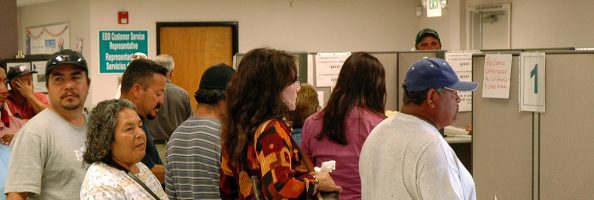Admissions Tip: Addressing Unemployment or Gaps in Employment

Given the emphasis that schools place on a candidate’s work experience, it is important to be proactive in addressing unemployment or gaps in employment. When applying to business school, many candidates worry about how the adcom might perceive gaps in employment. We would like to take some time to discuss strategies for addressing this issue.
Structural Unemployment Is Coming, Says WorkingNation Founder

Speaking on Wharton’s SiriusXM radio show Knowledge@Wharton, University of Pennsylvania alum and board member, Chicago Booth MBA grad and founder of WorkingNation Arthur Bilger spoke on what may be the next great economic epidemic: structural unemployment.
Graziadio Dean on the Future of the Job Market

Dean David Smith of Pepperdine University’s Graziadio School of Management recently wrote a piece for the LA Daily News on the state of California’s most recent unemployment rate.
In a guest commentary, Smith addressed the state’s 4.9 percent jobless number, which, while markedly lower than last year’s figure, is still cause for close attention by recent grads.
Seattle Unemployment Falls While Real Estate Booms

Seattle’s unemployment rate reached 3.9 percent this past September—the lowest rate in five years. In 2011, the city’s jobless rate hovered around 8 percent. The drop in unemployment is due to many factors, not the least of which is Seattle’s booming tech economy. Continue reading…
Columbia Breaks Down What Brexit Could Mean Down The Road

Columbia Business School posted an article on its blog this week by Professor and Nobel laureate Joseph E. Stiglitz about the potential economic fallout that the United Kingdom’s recent “Brexit” referendum could have on the global political arena in the not-too-distant future. Continue reading…
SFSU College of Business Professor Co-Authors Article on Career Disasters

San Francisco State University College of Business Professor of Management Mitchell Marks co-authored an article about how people respond to career disasters, according to a press release from the school. The article appeared on June 18 in the Harvard Business Review. The article was also co-authored by Phillip Mirvis, organizational leader and senior fellow at Boston College’s Center for Corporate Citizenship and Ron Ashkenas, managing partner of Schaffer Consulting.
The authors worked with Tim Hall, a leading expert in careers at Boston University’s Questrom School of Business, to analyze data about how managers said they recovered from career disasters. They identified three distinct patterns that emerged when people responded to career disasters. Some stewed over their loss and got lost in an endless cycle of self-justification. Others attempted to work through their setbacks but struggled to adapt to the new realities they faced. Almost half of respondents focused on learning from their loss through “identity work,” where one thinks about the role they play, sought advice and opinions from others, and took steps to care for themselves. The last group was most successful in moving past their career disaster.
While the other groups suffered from their inability to accept responsibility or dwelling on past failures, those who learned from their loss benefited from a new outlook on their life and career. Adaptability was one facet of a manager’s recovery. Seeking out peers’ opinions and reflecting upon their own actions led these managers see how they could have done better and improve upon it in the future. Another important part of recovery was evaluating your “self-system,” or your self-image in relation to their environment. Careful thought and reflection in both these categories led managers to success moving on with their careers and ultimately viewing their career disaster as a positive step forward.
